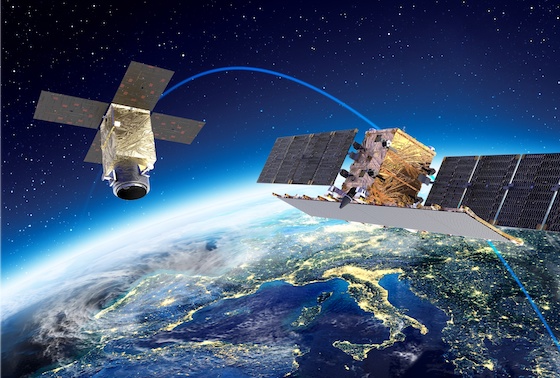Thales Adjusts Workforce to Respond to Commercial Satellite Market Headwinds

Rendering of Italy’s IRIDE constellation. Photo: Thales Alenia Space
Thales Alenia Space reported a dip in demand for commercial telecommunication satellite orders in 2023, and is shifting part of its workforce to respond to the change. Thales announced the move in its 2023 full year results on March 5.
Thales plans to redeploy 1,300 positions — 1,000 of which are located in France — to other Thales activities. Those redeployments will take place over 2024 and 2025.
Sales in the Aerospace segment totaled 5.2 billion euros ($5.7 billion), up 10.7% from 2022. Sales in Space, which is part of the Aerospace segment, were stable compared to 2022. Observation, Exploration and Navigation (OEN) activities posted a high-single digit increase in sales over the year.
Yet commercial telecommunications, which accounts for a third of sales in the Space segment, was affected by delays in executing several contracts because of supply chain issues with the propulsion system.
Thales CEO Patrice Caine addressed inflation, supply chain issues, and the changing Geostationary Orbit (GEO) market on a call with investors on Tuesday.
“Inflation has reached unprecedented levels and supply chain difficulties notably for propulsion in our case. Those have led to delays and higher costs in development of our new generation of satellites,” Caine said. “In addition, the underlying market dynamics have been changing with lower GEO satellite orders moving from 20 historically to 10 per year in 2023, while the emergence of megaconstellations impacts the business model of satellite operators.”
In 2023, Thales booked six large contracts for Observation, Exploration, and Navigation, including Italian constellation IRIDE, Galileo contract amendments, and a contract to supply payloads for navigation satellites to a country in Asia. But 2023 orders were below 2022’s performance, with no large orders in the telecommunication satellite business.
The workforce redeployment is part of a contingency plan that Caine said will adapt the workforce to the new GEO market size and maintain the company’s ability to manage constellation projects, and defense and OEN opportunities. The goal is to restore profitability on the basis of the existing level of workload, Caine told investors.
As of December 31, 2023, the Space segment’s order book stood at 9.3 billion euros ($10.2 billion) up 2% from 2022.
Looking forward, Thales expects favorable growth prospects for the other areas of its Space business.
“Despite current headwinds, we identify market opportunities over the long-term such as the new generation of highly flexible GEO satellite, software-defined satellite, the IRIS² constellation in Europe and several other LEO/MEO projects. And in defense, we see indisputable sovereign growing needs, [such as the] Syracuse IV project for the French MoD,” Caine said.